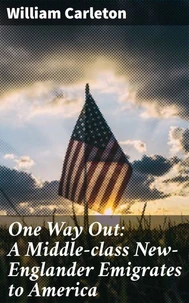The Hedge School; The Midnight Mass; The Donagh. Traits And Stories Of The Irish Peasantry, The Works of / William Carleton, Volume Three
Par :Formats :
Disponible dans votre compte client Decitre ou Furet du Nord dès validation de votre commande. Le format ePub est :
- Compatible avec une lecture sur My Vivlio (smartphone, tablette, ordinateur)
- Compatible avec une lecture sur liseuses Vivlio
- Pour les liseuses autres que Vivlio, vous devez utiliser le logiciel Adobe Digital Edition. Non compatible avec la lecture sur les liseuses Kindle, Remarkable et Sony
 , qui est-ce ?
, qui est-ce ?Notre partenaire de plateforme de lecture numérique où vous retrouverez l'ensemble de vos ebooks gratuitement
Pour en savoir plus sur nos ebooks, consultez notre aide en ligne ici
- Nombre de pages619
- FormatePub
- ISBN4057664569837
- EAN4057664569837
- Date de parution05/12/2019
- Protection num.Digital Watermarking
- Taille1 Mo
- Infos supplémentairesepub
- ÉditeurGOOD PRESS
Résumé
William Carleton's "The Hedge School; The Midnight Mass; The Donagh" serves as a poignant exploration of rural Irish life in the 19th century, offering readers a nuanced perspective on the socio-economic realities and cultural traditions of the period. Through his vivid storytelling and rich character development, Carleton delves into themes of education, religious practice, and community dynamics, encapsulating the struggles and triumphs of his protagonists amidst the backdrop of a deeply stratified society.
The literary style is marked by a blend of realism and local dialect, rendering both the setting and the characters authentically alive, while contextualizing the broader social changes that were sweeping through Ireland at the time. Carleton, born into a peasant family in County Tyrone, drew upon his own experiences to vividly portray the nuances of rural life. His upbringing amidst the harsh realities of the Irish agrarian system informed his keen insight into the complexities of the Irish identity and the impact of colonialism.
The author'Äôs deep-rooted empathy for the plight of the Irish people shines through in his work, as he seeks to illuminate their struggles and aspirations. This collection is a must-read for those interested in Irish literature and the historical context of the 19th century. Carleton'Äôs keen observations offer timeless reflections on education and faith that resonate beyond his era, inviting readers to consider the evolution of cultural identity in contemporary Irish society.
The literary style is marked by a blend of realism and local dialect, rendering both the setting and the characters authentically alive, while contextualizing the broader social changes that were sweeping through Ireland at the time. Carleton, born into a peasant family in County Tyrone, drew upon his own experiences to vividly portray the nuances of rural life. His upbringing amidst the harsh realities of the Irish agrarian system informed his keen insight into the complexities of the Irish identity and the impact of colonialism.
The author'Äôs deep-rooted empathy for the plight of the Irish people shines through in his work, as he seeks to illuminate their struggles and aspirations. This collection is a must-read for those interested in Irish literature and the historical context of the 19th century. Carleton'Äôs keen observations offer timeless reflections on education and faith that resonate beyond his era, inviting readers to consider the evolution of cultural identity in contemporary Irish society.
William Carleton's "The Hedge School; The Midnight Mass; The Donagh" serves as a poignant exploration of rural Irish life in the 19th century, offering readers a nuanced perspective on the socio-economic realities and cultural traditions of the period. Through his vivid storytelling and rich character development, Carleton delves into themes of education, religious practice, and community dynamics, encapsulating the struggles and triumphs of his protagonists amidst the backdrop of a deeply stratified society.
The literary style is marked by a blend of realism and local dialect, rendering both the setting and the characters authentically alive, while contextualizing the broader social changes that were sweeping through Ireland at the time. Carleton, born into a peasant family in County Tyrone, drew upon his own experiences to vividly portray the nuances of rural life. His upbringing amidst the harsh realities of the Irish agrarian system informed his keen insight into the complexities of the Irish identity and the impact of colonialism.
The author'Äôs deep-rooted empathy for the plight of the Irish people shines through in his work, as he seeks to illuminate their struggles and aspirations. This collection is a must-read for those interested in Irish literature and the historical context of the 19th century. Carleton'Äôs keen observations offer timeless reflections on education and faith that resonate beyond his era, inviting readers to consider the evolution of cultural identity in contemporary Irish society.
The literary style is marked by a blend of realism and local dialect, rendering both the setting and the characters authentically alive, while contextualizing the broader social changes that were sweeping through Ireland at the time. Carleton, born into a peasant family in County Tyrone, drew upon his own experiences to vividly portray the nuances of rural life. His upbringing amidst the harsh realities of the Irish agrarian system informed his keen insight into the complexities of the Irish identity and the impact of colonialism.
The author'Äôs deep-rooted empathy for the plight of the Irish people shines through in his work, as he seeks to illuminate their struggles and aspirations. This collection is a must-read for those interested in Irish literature and the historical context of the 19th century. Carleton'Äôs keen observations offer timeless reflections on education and faith that resonate beyond his era, inviting readers to consider the evolution of cultural identity in contemporary Irish society.



